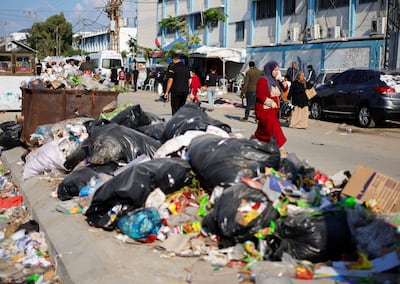Live updates: Follow the latest news on Israel-Gaza
As Gaza's desalination plants grind to a halt, queues of people carrying empty water bottles have become longer and the chances of full vessels making it back to thirsty families have become dimmer.
“We heat the salt water, and when it cools, we drink it,” said Mahmoud Al Shorbaji, as people behind him stood in line.
Even children's powdered milk is not completely safe to drink.
“I came here so I can fill up water for my kids,” said Fadel Hamad, a Palestinian father and refugee. “The little children need to drink and we need to make milk for them. The water in the tanks is salty and not suitable for drinking.”
Gaza has been attacked relentlessly by the Israeli military in response to the devastating Hamas attacks in southern Israel on October 7.
A small fraction of the enclave's water comes from Israel, while about 90 per cent comes from groundwater wells that need to be treated for human consumption. The main issue is the lack of electricity and fuel to power water pumps across the city.
Air strikes have also led most water lorries to suspend operations and bottled water is severely limited and unaffordable, according to the UN.
Some civilians, like Wafa Matar, 31, said her own children haven't had access to any water since October 7.
“We have no water, no electricity. Whatever we are getting is being used for drinking water,” she told The National on the 13th day of Hamas's war with Israel.
“My children have not had a bath since the beginning of the war.”
Ms Matar said she had waited in line for hours for bread but was unable to get any.
Food supplies are also running low for the 2.3 million population as only 20 lorries of aid have so far been able to access the coastal enclave.
“Gaza is running out of water and Gaza is running out of life,” said Philippe Lazzarini, chief of the UN agency for Palestinians earlier this week.
Ms Matar left her home after a blast targeted a building nearby and her husband was apprehended by authorities for unknown reasons.
Residents who spoke to The National told similar stories of hardship and desperation as officials continued to warn about the spread of communicable diseases due to the lack of sanitation.
Looming water catastrophe
“I walk a long distance and get water from a truck by paying money,” said one young boy. “Our house was struck by an air strike.”
Amna Mustafa, a 27-year-old mother of two, told The National that her family, like many others, are struggling to salvage enough water to use on a daily basis.
“Not having water and electricity is hard with children. With the blast and dust, it's hard to keep the kids and surroundings clean. I couldn’t heat enough water to bathe them and I'm worried they will get sick from bathing in freezing water,” she said.
Ms Mustafa said the process to fill her family's water tank was “painful”.
Many parents are finding it frustrating not being able to provide their children with basic hygiene and secure surroundings.
“This is a simple yet impossible task for a parent to do here,” she said.
Gaza usually produces 850 tonnes of rubbish per day, Gaza Municipality spokesman Hosni Mhanna told The National.
Since the war erupted, it increased daily by 250 tonnes.
“Authorities are struggling to keep up with it,” said Mr Mhanna.

Volunteer groups are attempting to remove rubbish from the streets, but are unable to keep up with the significant amount as air strikes continue.
“We have resorted to leaving the garbage in one area due to security reasons and continuous air strikes and then taking them to an area to burn them,” Mr Mhanna said.
“We are attempting to control the situation in every way we can,” he said.
Tagreed Saeed, a 38-year-old mother of three, said the smell of rubbish was filling the streets.
Ms Saeed said she is worried “about the spread of disease from unhygienic surroundings” and that “her children will fall ill and there are no functioning hospitals”.
The Gaza Health Ministry has called upon retired doctors to head to work “immediately” at medical complexes.
The ministry has said it is accepting volunteers for those with “a permit to work in various medical fields”, as well as paramedics.
The Health Ministry said Israeli air strikes have hindered efforts to reach the wounded because of the destruction of roads leading to hospitals.
More than 3,785 people, including 1,524 children, 1,000 women and 120 elderly people, have been killed in Gaza, including 44 medical personnel, the ministry said.
About 1,400 people in Israel have been killed since the start of the war.

